6 Best Steady-State Cardiovascular Workouts To Build Endurance & Stamina

Steady-state cardio is one of the most effective methods for improving cardiovascular health, endurance, and burning fat. This type of exercise involves maintaining a consistent, moderate effort level over a prolonged period, making it ideal for individuals who want to burn calories and build stamina without the intensity of interval training. Whether you’re walking, jogging, swimming, or cycling, steady-state cardio workouts can be adapted to all fitness levels and offer a sustainable approach to long-term fitness.
Unlike high-intensity workouts that focus on short bursts of maximum effort, steady-state cardio allows you to settle into a rhythm, allowing you to sustain your workout for longer. This can lead to increased fat-burning, particularly when paired with a healthy diet, and improved endurance. Because of its moderate nature, steady-state cardio is also gentler on the joints, making it a great option for anyone who wants a lower-impact workout while still reaping substantial cardiovascular benefits.
Below, I’ll take you through six steady-state cardiovascular workouts that target different muscle groups and fitness goals. Each workout includes a variety of exercises to help keep things interesting while ensuring you’re working multiple muscle groups. By incorporating these workouts into your routine, you can boost your stamina, support fat loss, and improve your heart health.
Now, let’s explore the best steady-state cardiovascular workouts you can easily work into your fitness routine.
Workout #1: Treadmill Endurance Walk
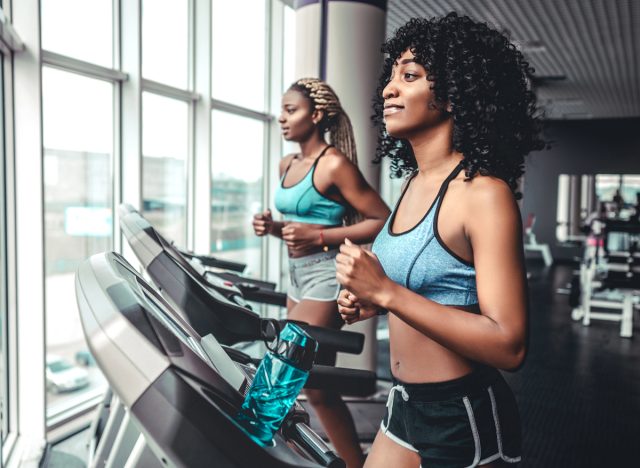
What You Need: A treadmill or a flat walking route outdoors. This workout is ideal for beginners or those looking for a low-impact way to increase cardiovascular endurance while burning calories. Walking at a steady pace helps to gently elevate your heart rate, making it a sustainable way to work toward fat loss and improve stamina.
The Routine:
1. Incline Walk (Warm-Up)
- Set your treadmill incline to 2-3% or find a slight hill outdoors.
- Walk at a moderate pace for 5 minutes to get your heart rate up and prepare your body for the workout.
2. Steady-State Walk
- Increase your speed slightly and keep walking briskly for 25-30 minutes.
- Aim to keep your heart rate in the aerobic zone (60-70% of your max heart rate).
- If using a treadmill, keep the incline between 2-4% to mimic outdoor terrain and engage your leg muscles more effectively.
3. Cool-Down
- Reduce your speed and incline to 0 for 5 minutes to gradually bring your heart rate back down.
- Focus on deep breathing and light walking to cool down.
Workout #2: Stationary Bike Session
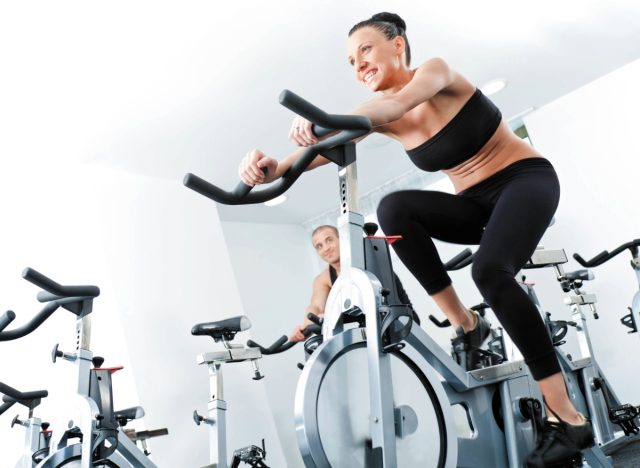
What You Need: A stationary bike or a regular bike for outdoor cycling. Cycling is a low-impact exercise that’s easy on the joints while offering a great way to increase endurance and burn fat. It strengthens your quads, hamstrings, and glutes, making it an effective lower-body workout that also elevates your heart rate for sustained cardio benefits.
The Routine:
1. Warm-Up
- Start with 5 minutes of light pedaling at a comfortable resistance level.
- Focus on gradually increasing your heart rate without overexerting yourself.
2. Steady-State Ride
- Adjust the bike’s resistance to a moderate level and pedal consistently for 30-40 minutes.
- Maintain a pace where you can hold a conversation but feel your heart working.
- Outdoors: Find a relatively flat route and keep a steady pace for the duration.
3. Cool-Down
- For the last 5 minutes, lower the resistance and pedal slowly to cool down.
- Stretch your legs afterward to release tension from the ride.
Workout #3: Swimming Laps

What You Need: Access to a swimming pool. Swimming is a full-body, low-impact workout that challenges your cardiovascular system while strengthening muscles in your arms, legs, and core. It’s gentle on the joints, making it perfect for those who need a non-weight-bearing form of cardio.
The Routine:
1. Warm-Up Swim
- Swim at an easy pace for 5 minutes, using any stroke you’re comfortable with, to warm up your muscles.
- Focus on controlled breathing and form as you move through the water.
2. Steady Swim (Freestyle)
- Swim continuously for 20-30 minutes, maintaining a steady, moderate pace.
- Alternate between freestyle (front crawl) and backstroke to engage different muscle groups.
- If needed, take brief breaks between laps, but aim to keep moving consistently.
3. Cool-Down Swim
- Finish with 5 minutes of slow, gentle swimming or floating.
- Focus on relaxing your muscles and cooling down in the water.
RELATED: Is ‘Zone 2 Cardio’ the Key To Speeding Up Workout Results?
Workout #4: Elliptical Training
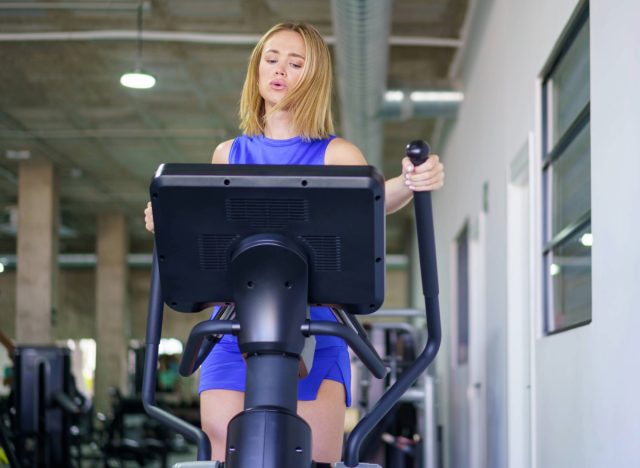
What You Need: An elliptical machine. The elliptical offers a great total-body workout that engages your lower and upper body, helping you burn calories while being easy on your knees and hips. It’s a low-impact machine that mimics the motion of running without impacting your joints.
The Routine:
1. Warm-Up
- Set the resistance level to low and move at a slow pace for 5 minutes to get your muscles ready.
2. Steady-State Elliptical Session
- Increase the resistance slightly and pedal moderately for 30-40 minutes.
- Focus on keeping a smooth, rhythmic motion, using both your legs and arms to propel the machine.
- Maintain a pace where you can hold a conversation but feel your heart rate increasing.
3. Cool-Down
- For the last 5 minutes, lower the resistance and pedal slowly to bring your heart rate back down.
- Stretch your arms and legs after stepping off the elliptical.
Workout #5: Rowing Machine
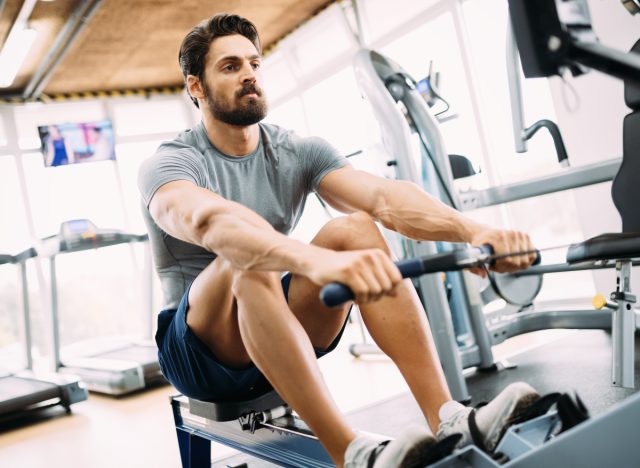
What You Need: A rowing machine. Rowing is a fantastic full-body workout that combines strength and cardiovascular endurance. It works your legs, core, and upper body, providing a comprehensive workout that strengthens muscles while improving heart health.
The Routine:
1. Warm-Up Row
- Set the resistance to low and row at an easy pace for 5 minutes.
- Focus on your form, making sure you’re using both your arms and legs to pull the handle.
2. Steady-State Rowing Session
- Increase the resistance to a moderate level and row continuously for 25-30 minutes.
- Keep a steady rhythm and focus on using your legs, core, and arms in sync.
- Aim to keep your strokes per minute between 22-26 for a consistent, steady pace.
3. Cool-Down Row
- Lower the resistance and row slowly for 5 minutes.
- Stretch your back, arms, and legs after the workout to release any tightness.
Workout #6: Outdoor Jogging
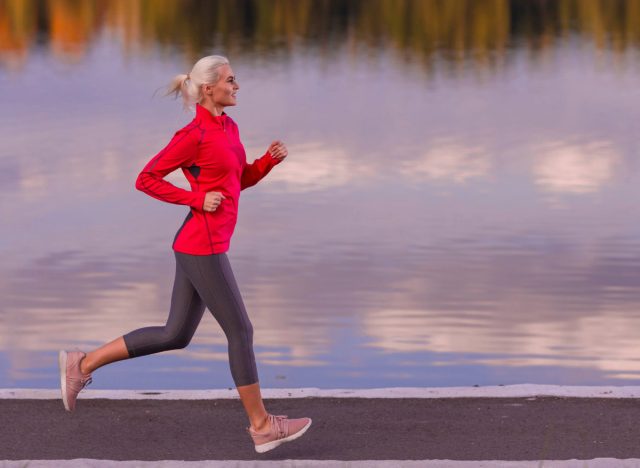
What You Need: A good pair of running shoes and a flat or gently rolling outdoor route. Jogging is a simple, effective way to boost cardiovascular endurance and burn calories. It strengthens your legs and improves heart health while allowing you to enjoy time outdoors.
The Routine:
1. Warm-Up Jog
- Begin with a 5-minute brisk walk or light jog to gradually elevate your heart rate and warm up your muscles.
2. Steady-State Jogging Session
- Increase your pace to a steady jog and maintain it for 30-40 minutes.
- Focus on keeping a rhythm where you can talk but still feel your heart working.
- If you’re a beginner, alternate between jogging and walking to build your endurance.
3. Cool-Down Walk
- Finish with a 5-minute walk to gradually bring your heart rate back down.
- Stretch your legs and lower back after completing the session.









